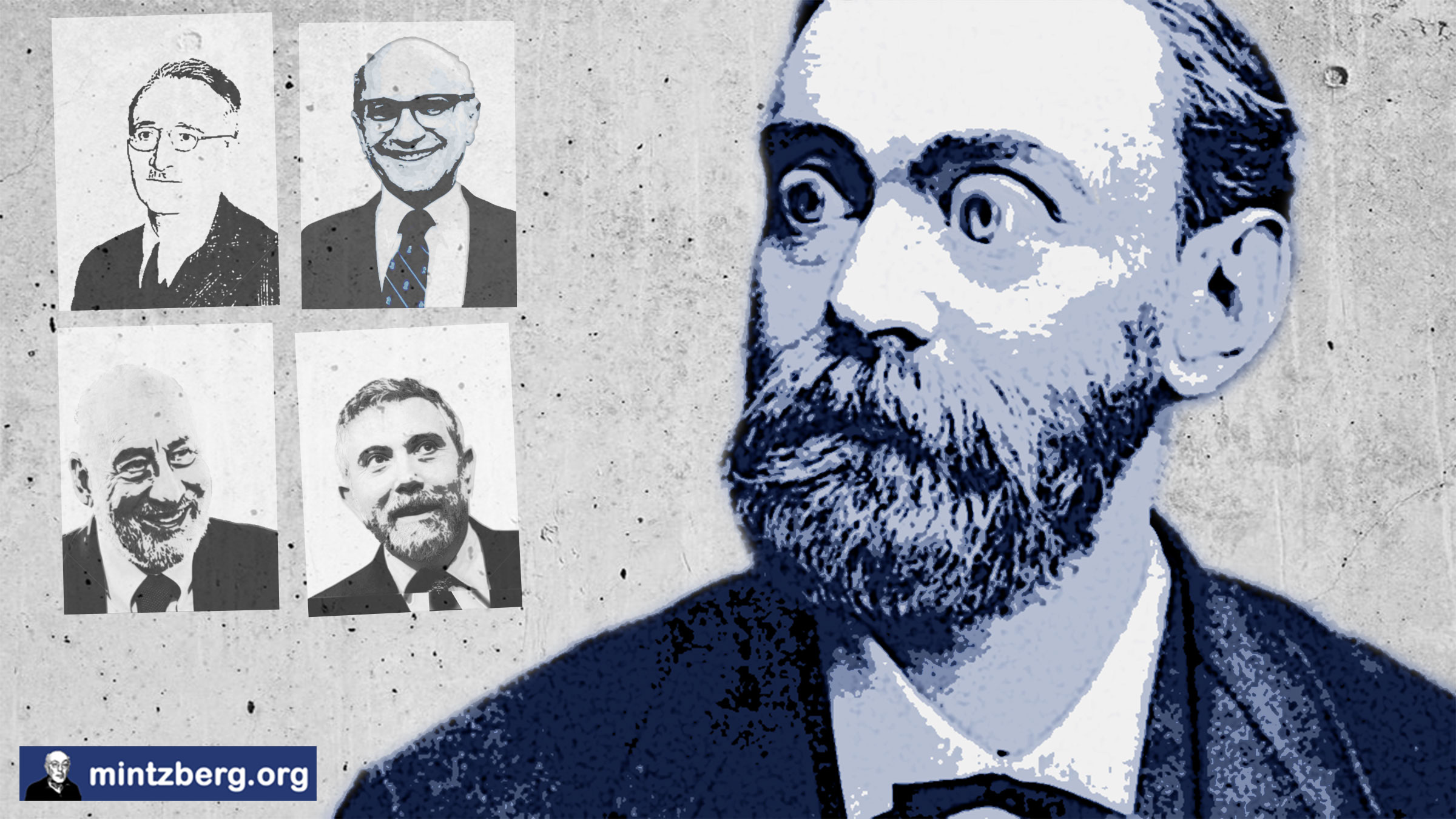Not noble: the fake fact of economics
22 October 2019

Alfred Nobel image: Wikimedia commons; Illustration: Collectiver
Six Nobel Prizes for 2019 have just been widely reported, five of them real.
In his will of 1896, Alfred Nobel created prizes in physics, chemistry, medicine, literature, and peace. Why, then, does nobelprize.org list a sixth one, in “economic sciences”, and then bury deep in its site the heading “Not a Nobel Prize”? And why do so many of its recipients, presumably selected for the integrity of their scholarship, claim to have won a Nobel Prize? Is this just another fake fact, too good to pass up? No, this one has serious consequences, that’s why I harp on it.
In 1968, the Bank of Sweden created a prize in its own name for the “economic sciences“ and added “in memory of Alfred Nobel.” With these superfluous words, the prize that economists created for themselves has come to be called “Nobel”, or sometimes “The Nobel Memorial Prize” (see even Wikipedia), as if the extra word is any less of a violation of Alfred Nobel’s will. Imagine if political scientists or anthropologists tried to get away with this.
Each of the social sciences has its central concept, for example power in political science, culture in anthropology, and markets in economics. Considered together, in balance, they provide a range of perspectives on human behavior. Considered alone, each narrows our perspective, at the limit into a dogma. Should we see our behavior primarily through the lens of power, or of culture?
Well, mainstream economics has convinced too many of us to see our behavior primarily through the lens of markets, in the form of a dogma that greed is good, markets are sufficient, and governments are suspect. As one view of the human condition, this makes some sense. As the view, it is nonsense. Yet this nonsense, in an unholy alliance with the private forces of greed, has been throwing much of the world dangerously out of balance. (When John Maynard Keynes declared famously that “In the long run we are all dead”, he meant each of us, not all of us. There is no collective “we” in economics, no sense of community. Thanks to the state of the world today, we could all be dead in the short run.)
A healthy society sustains balance across its three sectors: respected governments in the public sector, responsible businesses in the private sector, and robust communities in what should be called the plural sector. Thanks to this alliance, many ostensibly democratic societies have become unhealthy, not least the U.S. and U.K. Their private sectors dominate, coopting their governments, diminishing their communities, and undermining their democracy. On the international stage, economic globalization has become the new hegemony. Facing no countervailing power, it plays governments off against each other, driving down taxes at the expense of public services.
The consequences of this imbalance are all too evident, for example in the income disparities that are driving many frustrated people to vote for the likes of Trump and Brexit; in levels of production and consumption that exacerbate climate change; even in our everyday vocabulary that regards human beings as “human resources“ and citizens as “customers“ of governments. These days, every organization is supposed to act like a business, with every chief a CEO.
Where to begin the restoration of balance? We can hardly expect corporations to cede the power that they have amassed. And fixing capitalism, however necessary, will not fix democracies that are broken, any more than fixing communism would have fixed the broken societies of Eastern Europe (which were out of balance on the side of their public sectors). And how can we expect balance to be restored by governments that have been coopted by private interests.
This leaves the plural sector, were culture matters more than markets. If we are to stop our descent into self-destruction, a form of reformation will have to begin here. Some of us may work in the private sector and many of us may vote in the public sector but all of us live our social lives in the plural sector—for example, when volunteering for a cause, donating to an NGO, joining a protest, or just plain working out at the Y.
Our economically developed world is in dire need of social redevelopment. The restoration of balance will take a lot more than putting this economics prize in its place, namely as The Bank of Sweden Prize in Economic Sciences. But doing so could be a good place to start—even better if it’s name was changed to the Bank of Sweden Prize in the Social Sciences—by sending a message that private sector interests have to refocus their attention back in their place, namely the marketplace, so that our public sector governments and plural sector communities can get on with serving our collective and social needs.
© Henry Mintzberg 2019. See Rebalancing Society…radical renewal beyond left, right, and center.
Follow this TWOG on Twitter @mintzberg141, or receive the blogs directly in your inbox by subscribing here. To help disseminate these blogs, we also have a Facebook page and a LinkedIn page.